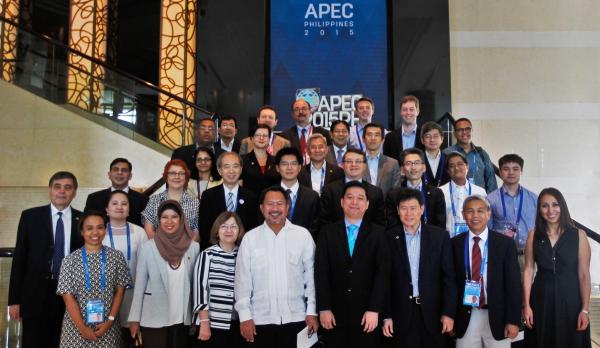MSMEs to benefit from harmonized APEC trade rules

Trade and Industry Assistant Secretary Ceferino S. Rodolfo (4th from left, front row), APEC senior official for trade, is one of the participants in the Senior Officials Meeting (SOM) Dialog on Regional Trade Agreements and Free Trade Agreements at the Radisson Blue Hotel Cebu. (APEC2015.PH)
SENIOR trade officials from Asia-Pacific Economic Cooperation (APEC) economies are trying to harmonize the Rules of Origin (ROO) to facilitate trade in the Asia-Pacific region.
“This will help in simplifying trade conditions and contribute greatly to APEC and WTO, who work on transparency,” said Trade and Industry Assistant Secretary Ceferino S. Rodolfo.
Harmonizing and streamlining the rules will also help the micro, small and medium enterprises (MSMEs) penetrate the regional market.
He said MSMEs make up 90 percent of the region’s businesses, and should be put at the “front and center” of the trade cooperation work.
ROO, as defined by the World Trade Organization (WTO), refers to the criteria needed to determine the national source of a product. These are vital in applying trade policy measures.
The WTO said that since economies practice these ROO in different ways, import and export procedures can become restrictive and complicated.
Harmonizing the ROO is the focus of the APEC Senior Officials Meeting (SOM) Dialog on Regional Trade Agreements (RTAs) and Free Trade Agreements (FTAs).
In his opening remarks, Rodolfo said harmonizing the trade rules in the region is also the main objective stipulated in the Boracay Action Agenda to Globalize MSMEs, which was created earlier this year.
The working committee will also be looking into mega-regional FTAs or “mega-regionals” as a “potential new pillar of trade governance.”
Mega-regionals remove trade barriers, such as tariffs and taxes, between participating economies.
Examples of mega-regionals include the Free Trade Area of Asia Pacific (FTAAP) and the ASEAN Economic Community (AEC), which is targeted to be established by the end of this year.
The APEC SOM will also cover discussions on trade facilitation advancements and challenges and explore new areas on RTAs and FTAs.
This renewed interest in trade facilitation and agreements, which was previously discussed in high-level RTA and FTA policy dialogs from 2003 to 2005, is part of APEC’s initiatives to advance regional economic integration. It is also done to contribute to FTAAP.
“We hope that through this dialog that will be happening, we will be able to contribute to the intellectual and policy foundation for the step-by-step work toward a comprehensive and quality FTAAP,” Rodolfo said.
He said that APEC member economies have already worked toward building a multi-lateral trade system that is transparent, non-discriminatory, open, rules-based and inclusive.
According to the APEC policy support unit, around 144 FTAs have been enforced by the APEC member economies.
This number comprises more than half of all FTAs in the world.
The support group, however, said that constant work should be done to ensure that all of these FTAs are transparent and inclusive.
“Trade is only a tool for development, and that giving market forces free rein is not enough to spread the benefits of trade and globalization to all,” Rodolfo said.
“The instruments that we develop, and the RTAs and FTAS that we deal should harness trade potential, ensuring that both developing and developed economies, and all sectors in our economies, benefit from our work,” he added.
Disclaimer: The comments uploaded on this site do not necessarily represent or reflect the views of management and owner of Cebudailynews. We reserve the right to exclude comments that we deem to be inconsistent with our editorial standards.
